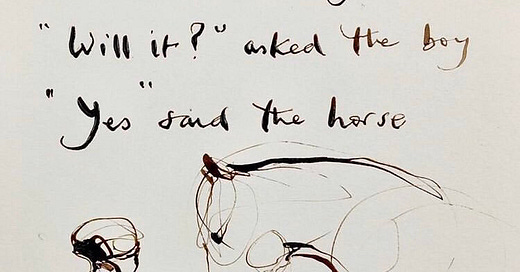Empathy is seeing with the eyes of another, listening with the ears of another and feeling with the heart of another. Alfred Adler
You don’t notice it the first time. Maybe not the second, either, but at some point you do. They initiate it to begin with, then you find yourself being the first one. Suddenly, you are the welcoming committee. Who put you in charge? Did you get it right? Did they understand your intent?
The tight-lipped smile with gentle eyes, softened, not accompanying the turn up of the mouth, and the nod. Always the nod.
It’s your new unspoken language. The briefest of encounters where nothing is said, the quiet remains, and you pass. But you have shared something with them, let them know that you understand.
“We see you. Welcome. You’re one of us. It’ll be ok.”
They are on a journey too. Unplanned, often suddenly propelled there, sometimes by accident.
Their child is sick. Your child is sick. This hospital is where you learn the greeting. You might see them, or others, outside of these corridors. Endless and labyrinthine with their painted sea creatures covering their length.
An overhead light flickers, stutters, marking that point where you first cried. Your stomach tightens every time you pass beneath it, feeling the wave of tears that you have held back, threaten to burst forth once again. Fix that damn light, you think.
Your child is sick. You wander the corridors looking for something. Something you left in your life before this hospital. Maybe the whole life you left there. Was it joy? Hope? You know you’ll recognise it when you see it, if you can just find it.
You turn the corner, heading towards the sliding doors which open to the world where time isn’t standing still, past the gift shop, its windows filled with soft toys and sticker books. You see the same soft dog that you bought your child when he first stayed here. The biggest one, grey, fuzzy haired with floppy ears covering its eyes.
Clarence. You named him Clarence after the ward you made home for those ten days.
If you can just reach those sliding doors before you cry, you think, it will all be ok. If you start crying before you cross the threshold, it might not be ok. You pinch the skin between your thumb and forefinger with the fingers of your opposite hand. Hard. The pain will stop them and it’ll all be ok.
Don’t look at the shop. Don’t look at the train built into the wall. The train he loved to sit in, spinning the steering wheel. Trains don’t have steering wheels, you think. Good, you’re heading them off, keep thinking about trains. Don’t. Think. Of. Him. In. That. Room.
You lost. You are back there. In the anaesthetist’s room. A sort of ante-chamber before they wheel him into the operating theatre. The room you’re allowed into, the place you leave him. The place you fall apart. But every time you go, and you vow this time you will not break.
As his eyes roll back and he goes “to sleep”, that sleep that looks like he died, you shatter.
You left some of your pieces in that room, and every other room just like it, every time he went to sleep.
Just then you are aware of the mum walking towards you, gripping the handles of the pushchair. She is looking at you with that tight-lipped smile. She sees you. It will be ok, she says, wordlessly.
It will be ok.






Such a beautiful and crushing piece of writing ❤️ My heart breaks for what is behind it, what bought this writing into the world, but its beauty stands alone. One of sorrow's gifts ❤️
The panic... I really felt it. Amazing job.